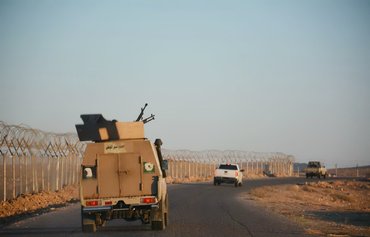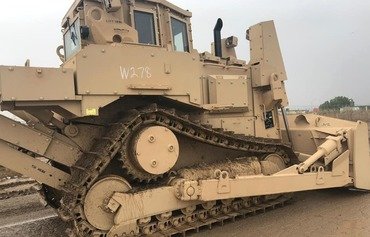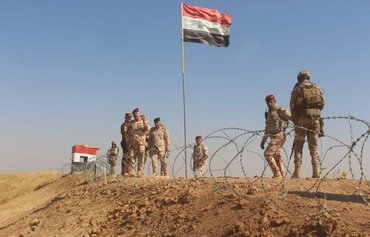Iraqi forces have been working to fortify the border with Syria and thwart the infiltration of "Islamic State of Iraq and Syria" (ISIS) elements by building physical barricades and setting up fortification technology.
The border is being equipped with guard posts as well as thermal cameras and remote sensors to detect any movement in the area.
In mid-April, the Iraqi army and Border Guard finished digging a 100-kilometre trench along the border, separating the Anbar province cities of Rawa and al-Qaim from the Syrian side.
The trench is six metres wide and three metres deep, and the earth removed from it has been used to build an earth berm to reinforce the fortifications.
![Iraqi Border Guard personnel conduct inspections in the Anbar province city of al-Qaim, near the border with Syria. [Photo courtesy of the Iraqi Border Guard]](/cnmi_di/images/2018/08/23/14101-Iraq-Qaim-border-600_384.jpg)
Iraqi Border Guard personnel conduct inspections in the Anbar province city of al-Qaim, near the border with Syria. [Photo courtesy of the Iraqi Border Guard]
Border Guard forces in late June began another project to complement the border protection measures, which includes the construction of a barbed-wire fence outfitted with watchtowers and monitoring equipment and mobile patrols.
Fortification measures
The fortification measures have been effective in barring ISIS elements from penetrating the border, Rawa mayor Hussein Ali al-Akidi told Diyaruna.
"Security forces, including al-Jazeera Operations Command, the army and Border Guard, are enforcing strict control of the border area with Syria," he said.
Practical measures include digging "a deep trench, building an earth berm and installing a barbed wire fence, and turning them into smart fortifications through the use of cameras and advanced monitoring and sensing equipment", he said.
These measures have "enhanced border security and reduced infiltrations by terrorists from Syrian territory by 80%", al-Akidi said.
Troops have been heavily deployed at several border posts, he said, and there has been 24-hour surveillance in key areas.
"Our borders were previously wide open and are closed shut now," he noted.
Sporadic infiltration attempts are quickly thwarted, he added, with those attempting to cross illegally into Iraq targeted by airstrikes while they are still in the desert.
"Iraqi forces and international coalition aircraft recently dealt debilitating blows to ISIS, targeting infiltrators belonging to the group in the desert of western Anbar," al-Akidi said.
A coalition airstrike north of Rawa on August 7th killed "a number of terrorists who were holed up in a cave", he said, adding that it was later determined they were infiltrators and senior ISIS leaders.
Diminished border threat
"ISIS’s attempts to breach the border are no longer successful," Anbar province council spokesman Eid Ammash told Diyaruna.
"The threat from across the Syrian border has receded quite a bit, thanks to several factors, particularly the intensive security fortifications and rigorous military activity to secure the border strip and nearby desert," he said.
Ammash said breaches that do occur, and are immediately thwarted, all come from the Syrian area of Hajin, and al-Sousa and Baghuz villages, which are adjacent to the Upper Euphrates desert north of the cities of Rawa and al-Qaim.
"It is essential that no gap is left for the enemy to use to infiltrate into our territory," he said.
"The trench and other fortifications will definitely curb infiltration by terrorists and hinder the passage of their vehicles and car bombs," said Ahrar al-Furat party chairman Sheikh Abdullah al-Jughaifi, former commander of the Anbar tribal mobilisation forces.
"However, these measures alone are not sufficient to ward off the danger unless they are accompanied by air cover," he told Diyaruna.
Heightened activity on the ground, including round-the-clock surveillance and tracking, is also necessary, he said, noting that all these measures are already in place.

![Iraqi Border Guard officers inspect a new barbed-wire fence separating the Iraqi and Syrian border. [Photo courtesy of the Iraqi Border Guard]](/cnmi_di/images/2018/08/23/14100-Iraq-Syria-border-600_384.jpg)






